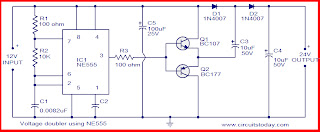Zero-crossing detector is an applied form of comparator. Either of the op-amp basic comparator
circuits discussed can be employed as the zero-crossing detector provided the reference voltage Vref
is made zero. Zero-crossing detector using inverting op-amp comparator is depicted in figure. The
output voltage waveform shown in figure indicates when and in what direction an input signal vin
crosses zero volt. In some applications the input signal may be low frequency one (i.e. input may be
a slowly changing waveform). In such a case output voltage vOUT may not switch quickly from one
saturation state to the other. Because of the noise at the input terminals of the op-amp, there may
be fluctuation in output voltage between two saturation states (+ Vsat and – Vsat voltages). Thus
zero crossings may be detected for noise voltages as well as input signal vin. Both of these problems
can be overcome, if we use regenerative or positive feeding causing the output voltage vout to change
faster and eliminating the false output transitions that may be caused due to noise at the input of
the op-amp.
source:http://www.circuitstoday.com
MNC TV
TV UNO
























